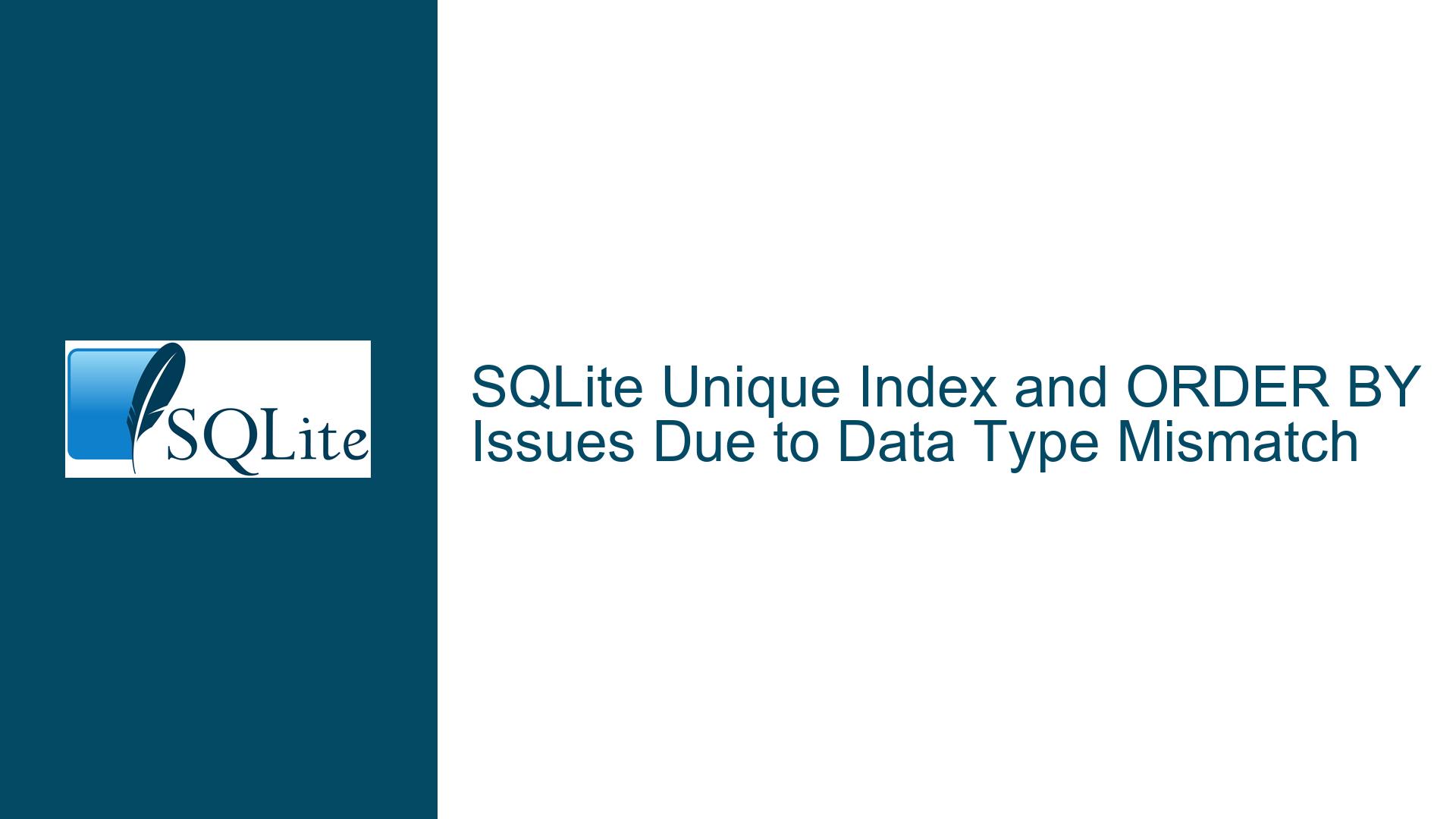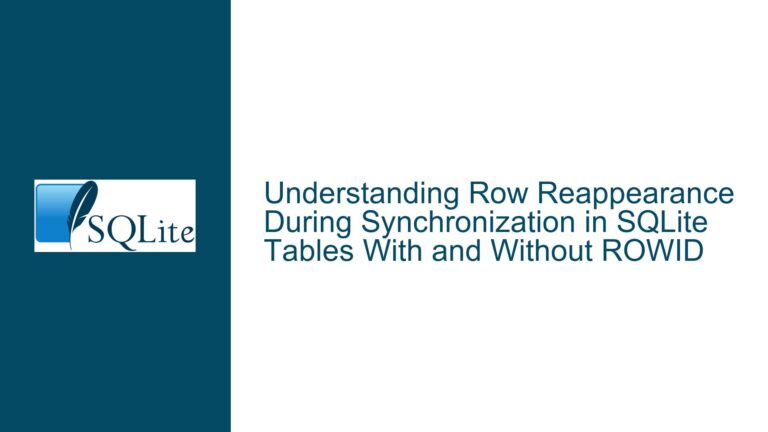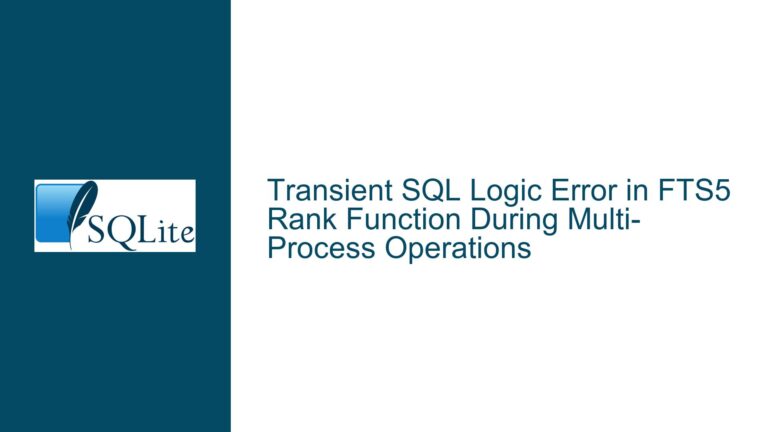SQLite Unique Index and ORDER BY Issues Due to Data Type Mismatch
Data Type Mismatch in AnswerID Column Causing ORDER BY and Unique Index Failures
The core issue revolves around the AnswerID column in the Answers table, which is expected to contain integer values but instead stores text strings. This data type mismatch leads to unexpected behavior in SQLite operations such as ORDER BY and the enforcement of unique indexes. The AnswerID column, despite appearing to contain numeric values, is stored as text, causing comparisons and sorting to fail in predictable ways. For instance, when attempting to order the AnswerID column, the results are not numerically sorted because SQLite treats the values as strings rather than integers. Similarly, the unique index on AnswerID fails to enforce uniqueness correctly because text comparisons are used instead of numeric comparisons.
The root cause of this issue lies in the schema definition and data insertion process. The Answers table does not enforce a specific data type for the AnswerID column, allowing text values to be inserted even when numeric values are intended. This lack of type affinity in SQLite means that the database does not automatically convert text representations of numbers into integers. As a result, operations that rely on numeric comparisons, such as ORDER BY and unique constraints, behave inconsistently.
To further illustrate the problem, consider the following query results:
sqlite> select answerid, typeof(answerid) from answers;
10070|text
10090|text
10120|text
10140|text
10160|text
10440|text
10470|text
10540|text
11500|text
11630|text
11650|text
Here, the AnswerID values are stored as text, even though they appear to be numeric. This discrepancy becomes evident when attempting to query the table using numeric literals, such as:
select * from answers where answerid in (10120,10160);
This query returns no results because the text values in the AnswerID column cannot be directly compared to the integer literals 10120 and 10160. However, casting the AnswerID column to an integer resolves the issue:
select * from answers where cast(answerid as integer) in (10120,10160);
This query successfully returns the expected rows because the CAST operation converts the text values to integers, enabling proper numeric comparison.
Text Storage in AnswerID Column Leading to Sorting and Comparison Failures
The primary cause of the observed issues is the storage of numeric values as text in the AnswerID column. SQLite’s type affinity system allows columns to store values of any data type, but this flexibility can lead to unintended consequences when the stored data does not match the expected type. In this case, the AnswerID column is intended to store integers, but the actual data consists of text strings. This mismatch causes several problems:
Sorting Issues: When the
ORDER BYclause is used on theAnswerIDcolumn, SQLite performs a lexicographical (text-based) sort instead of a numeric sort. For example, the value'10070'is sorted as a string, which means it is compared character by character rather than as a whole number. This results in an incorrect order when the values are intended to be numeric.Comparison Failures: Queries that compare the
AnswerIDcolumn to numeric literals fail because SQLite does not automatically convert text values to integers for comparison. For instance, the queryselect * from answers where answerid = 10120;fails because the text value'10120'is not equal to the integer10120in SQLite’s type system.Unique Index Enforcement: The unique index on the
AnswerIDcolumn is based on text comparisons, which means that two values like'10120'and10120(as an integer) would be considered distinct. This undermines the purpose of the unique index, as it fails to prevent duplicate numeric values stored in different formats.
The root cause of these issues is the lack of strict type enforcement in the Answers table schema. The AnswerID column is defined without a specific data type, allowing any type of value to be inserted. This flexibility, while useful in some scenarios, becomes a liability when the data does not conform to the expected type.
Resolving Data Type Mismatch with CAST and Schema Adjustments
To address the data type mismatch in the AnswerID column, several steps can be taken to ensure that the column contains consistent and correctly typed data. These steps include modifying queries to handle type conversions, updating the schema to enforce data types, and cleaning up existing data.
Step 1: Use CAST in Queries for Immediate Fixes
For immediate fixes, the CAST function can be used in queries to convert text values to integers. This ensures that numeric comparisons and sorting operations work as intended. For example:
select * from answers where cast(answerid as integer) in (10120,10160);
This query converts the AnswerID values to integers before performing the comparison, ensuring that the correct rows are returned. Similarly, sorting can be corrected by casting the AnswerID column:
select '-'||answerid||'-' from answers order by cast(answerid as integer);
This query sorts the AnswerID values numerically, producing the expected order.
Step 2: Update the Schema to Enforce Data Types
To prevent future issues, the schema of the Answers table should be updated to enforce the correct data type for the AnswerID column. This can be done by recreating the table with a strict type definition:
CREATE TABLE Answers (
AnswerID INTEGER PRIMARY KEY,
Answer TEXT,
lasteditdate TEXT,
lastedituser TEXT,
status TEXT
);
This schema ensures that the AnswerID column can only store integer values, preventing the insertion of text values. Note that this change requires migrating existing data to the new table, which can be done using the following steps:
- Create a new table with the updated schema.
- Copy data from the old table to the new table, casting the
AnswerIDcolumn to integers:INSERT INTO NewAnswers SELECT cast(AnswerID as integer), Answer, lasteditdate, lastedituser, status FROM Answers; - Drop the old table and rename the new table to the original name:
DROP TABLE Answers; ALTER TABLE NewAnswers RENAME TO Answers;
Step 3: Clean Up Existing Data
Before updating the schema, it is important to clean up existing data to ensure that all AnswerID values are valid integers. This can be done using a query to identify non-numeric values:
SELECT AnswerID FROM Answers WHERE typeof(AnswerID) != 'integer' AND AnswerID NOT GLOB '*[^0-9]*';
This query identifies AnswerID values that are stored as text but contain only numeric characters. These values can be updated to integers using the CAST function:
UPDATE Answers SET AnswerID = cast(AnswerID as integer) WHERE typeof(AnswerID) != 'integer' AND AnswerID NOT GLOB '*[^0-9]*';
For values that contain non-numeric characters, additional cleanup may be required to either remove the non-numeric characters or handle them appropriately.
Step 4: Implement Data Validation
To prevent future data type mismatches, implement data validation at the application level to ensure that only valid integers are inserted into the AnswerID column. This can be done using input validation routines or database constraints. For example, a check constraint can be added to the Answers table to enforce numeric values:
ALTER TABLE Answers ADD CHECK (typeof(AnswerID) = 'integer');
This constraint ensures that only integer values can be inserted into the AnswerID column, preventing text values from being stored.
Step 5: Monitor and Test
After implementing the above changes, monitor the database for any issues and perform thorough testing to ensure that the AnswerID column behaves as expected. This includes testing sorting, comparisons, and unique index enforcement to verify that the data type mismatch has been resolved.
By following these steps, the data type mismatch in the AnswerID column can be resolved, ensuring that SQLite operations such as ORDER BY and unique index enforcement work correctly. This approach not only fixes the immediate issues but also prevents future problems by enforcing strict data types and validating input data.






